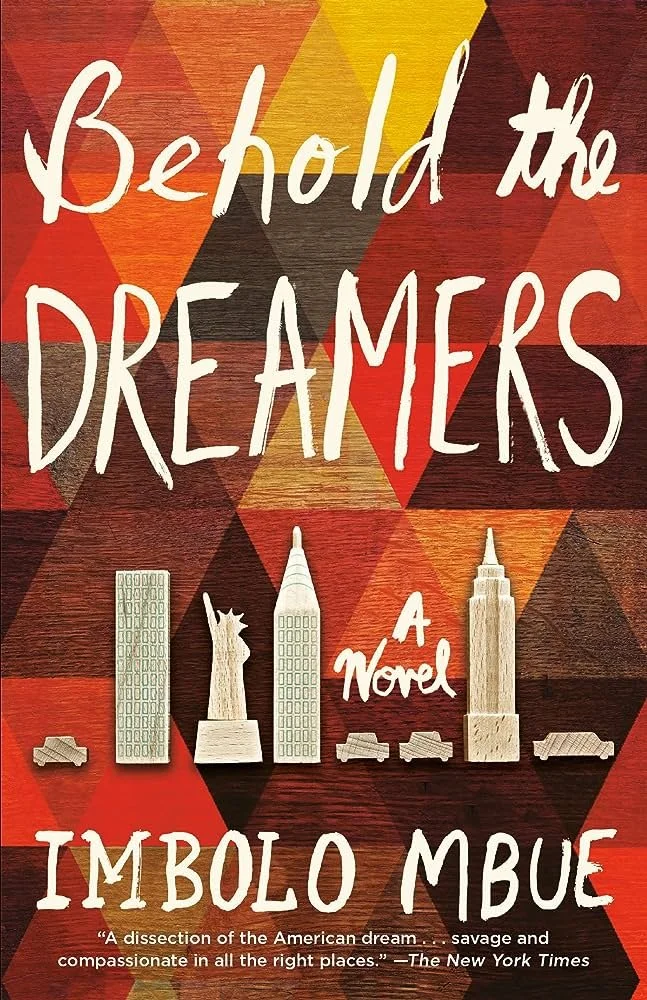Behold the Dreamers by Imbolo Mbue
It was a very emotional experience reading this novel. Mbue makes sure you come away with your feelings having been put into a blender and you’re not sure what to do with the outcome. There is a different perspective to have as an American citizen writing this, especially with the country we live in, and the administration we are being governed under. It’s hard not to wonder, if Jende and his family experienced this in 2018, would their story have been better? Worse? Would he still feel like the United States was the greatest country in the world?
While Jende was the main character in this novel, Neni was the most dynamic. Her unrelenting persistence is a two edged sword, invaluable when it comes to the survival of her family, but at times has you wishing she would pull back. Her altercation with Mrs. Edwards resulting in extortion of ten thousand dollars from her for her family shows the level of desperation she had reached to make sure they are taken care of. In a moment, considering having her professor and his husband adopt her son Liomi so he could become an American citizen. Suggesting to Jende that they divorce for a time so she can marry a Jamaican for papers. Neni will stop at nothing to find a way for her family to stay in the states.
Through the uncertainties of possible deportation, the Jongas do well to maintain a feeling of normalcy in the home, so as to not disrupt the routines Liomi has grown accustomed to. But the thread begins to unravel quickly when Mr. Edwards tells Jende he has been let go. Jende becomes the most downcast he has ever been, after learning he can not even return to his former job as a taxi driver, but must settle for washing dishes 16 hours a day for minimum wage at a restaurant. Neni tries to alleviate his stress in the best way she knows how, but the weight and fear of an unknown future, coupled with the failure he feels within himself in the present, causes him to lash out at Neni physically, forcing her to sustain physical bruises that mirror the emotional ones he has sustained to his ego and manhood. Neni’s beating was for me the lowest point in the novel. The way everything had so sadly come to a head, as a reader who is witnessing this story from the outside in, it was hard to get through. But like many marriages, they covered it up. Neni made excuses for Jende in her head, as she tried to convince herself that this was not the man she married. This man was a product of the constant beat down of America’s reality. She held out hoping that things would get better, and he would return to being the old loving, caring, happy Jende.
The Edwards also had their challenges as a couple, despite how wealthy they were. Each felt unappreciated by the other, and this propelled them both to seek solace outside of their marriage. Cindy numbed her feelings through her use of drugs and alcohol and her husband distracted himself with his work and occasional visits to a hotel where he would have his stress relieved by an escort. Mbue intimates in the novel Mr. Edwards’ desire to connect with his wife when he reveals to Jende his attempt to share his love with poetry with his wife once upon a time, but unfortunately his enthusiasm was dismissed by her. I come away from the novel with the impression that the tension built between the two of them was slow, with seemingly insignificant actions on both sides that cultivated an environment of resentment and mistrust, an environment that certainly contributed to Cindy’s death.
Regardless of the emotions that Mbue incites while reading the novel, her way with words is something to be admired. One sentence that stood out to me in the entire novel comes shortly after Jende learns he has lost his father. He manages to keep it together for majority of the day, though his supervisor excuses him early from his job after hearing the news. But when he returns home and meets Neni, Mbue writes that ‘it was then the dam behind his eyelids broke’. I had not continued reading immediately because that sentence does so well in describing the lengths Jende has gone not to be moved to tears despite all that has happened up to this point. But the loss of his father is the realization that forces him to break down emotionally.
From the time in the courtroom when Jende expresses to the judge his desire to go back to Cameroon, to when they board their flight home, I expected, or rather hoped, that something would happen for them to stay in the states, or perhaps Jende would wake up one morning and change his mind. Even as they sold their things, even as they gave up their apartment, even as they had their final get together with their close friends, I hoped that something, anything, would change their current course. It was hard to accept that they were really going back to Limbe. Being the kind of person to hold on the last strand of hope until there is no hope left, I fought the truth that this really was the end. But perhaps in this case, it was better to go home. Did Jende really ‘lose’ in this regard? America is portrayed as such a place where everyone wants to come and stay. It’s unheard of in immigrant communities that anyone would voluntarily leave. But the reality of America is, it is hard here, just like it is hard anywhere else. Though, yes, they ended up going back, they returned in a much better position than they were. Perhaps in this case, they were not meant to come and stay. Perhaps America was supposed to be a means to an end, a way for them to better their lives and their children’s future in Cameroon.

